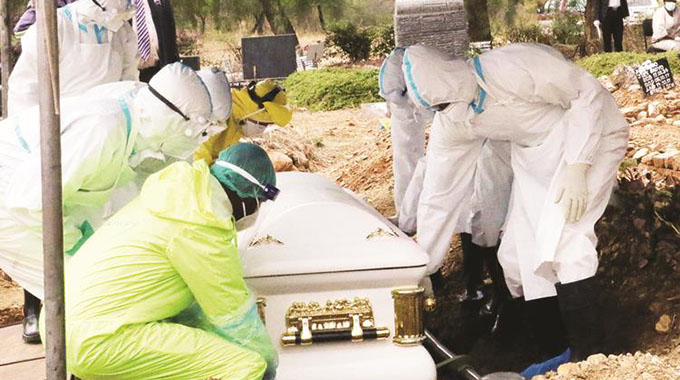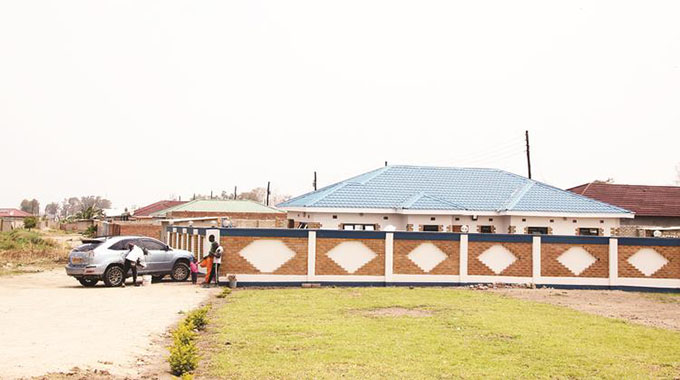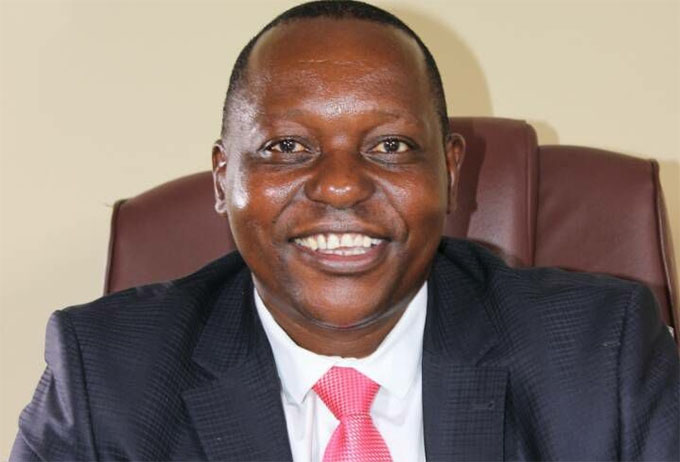Brig-Gen Ndlovu laid to rest

Brigadier-General Sambulo Ndlovu was buried at Lady Stanley Cemetery in Bulawayo yesterday.
The freedom fighter, whose Chimurenga/Umvukela name was Stanley Hlayibeni, succumbed to a Covid-19 related illness on Tuesday at Parirenyatwa Hospital at the age of 65.
He is survived by wife Sarah and six children.
His burial was carried out according to the World Health Organisation guidelines on Covid-19.
The burial was attended by family members, senior army officials, both serving and retired, and Bulawayo Provincial Affairs and Devolution Minister Judith Ncube, who observed that Brig-Gen Ndlovu’s contributions to the country befits that he be declared a national hero.
“I was listening to his biography as was read by Major-General David Sigauke,” she said. “Indeed, we are burying a national hero. There is no doubt about that. We mourn with the Ndlovu family, his widow uMaNdlovu and we say we have to accept that it was the Lord’s time.
“He survived very dangerous encounters during the war of independence only to be killed by an invisible enemy, Covid-19.”
Brig-Gen Ndlovu’s elder brother Mr Themba Ndlovu said the family believed he deserved to be declared a national hero.
“He served this country and we believe he deserved to be declared a national hero,” he said. “We have heard that the application has been submitted for him to be declared so, but the response delayed and we had to proceed with the burial.
“We are devastated by his death as a family, but we just have to accept his demise. Covid-19 is killing a lot of people across the world and there is nothing we could have done. This is a pandemic.”
ZNA Chief of Staff (General Staff) Maj-Gen Sigauke, eulogised Brig-Gen as a fine soldier who served the country with due diligence.
He said Brig-Gen Ndlovu was no ordinary man, but a true revolutionary who contributed to both domestic and regional peace.
“Brig-Gen Ndlovu will be remembered for immense contribution to the liberation struggle, standing firm for justice and defending Zimbabwe’s interests both domestically and in the foreign domain,” he said.
“He was a warm, likeable, humble, patriotic, selfless team player and indeed a true diplomat par excellence and a revolutionary cadre.”
Brig Gen Ndlovu was described by the Zimbabwe National Army as a true revolutionary and Comrade who gave up his youth to fight for the freedom being enjoyed by Zimbabweans today.
Born on February 19, 1955 in Gwanda, Matabeleland South, Brig Gen Ndlovu grew up in Matshetsheni communal lands at an area called Shake where he attended Shake Primary School from 1961 to 1968, but could not proceed due to financial challenges.
He then took up apprenticeship in carpentry at Mlezu Agricultural Institute in Kwekwe from 1969 to 1971.
Brig Gen Ndlovu later joined Midlands Construction company as a leaner carpenter. He became a political activist at a tender age of 16.
This saw him joining the Youth Wing of the African National Congress led by Bishop Muzorewa in 1971 as the branch secretary of Mkoba Ward.
He played a pivotal role to reject the referendum by the Pearce Commission in 1972 which was appointed by the then British Government to ascertain the reaction of black Africans to the sanctions against Rhodesia.
In 1974, he joined the Roberts Construction in Bulawayo, and later secured a Botswana temporary residence permit to work in Botswana.
During this period, he sacrificed his job after he was tasked by ZAPU to recruit youths for the purpose of joining the armed struggle.
He then joined the liberation struggle in 1975.
Brig Gen Ndlovu did his basic military training at Mwembeshi Training Camp in Zambia in 1976 and upon completion, he left for the Union of Soviet Socialist Republics. He was deployed into the then Rhodesia in early 1977 for operations in Northern Front in Sipolilo now Guruve.
At independence, the general officer was attested into the Zimbabwe National Army on August 24, 1981 as a private soldier and was posted to 404 Infantry battalion. — Bulawayo Bureau/Herald Reporter.









Comments